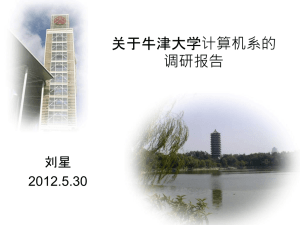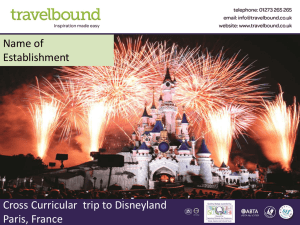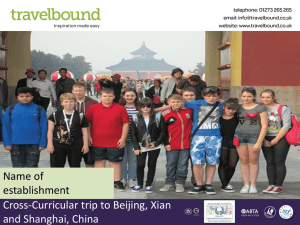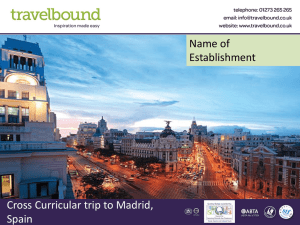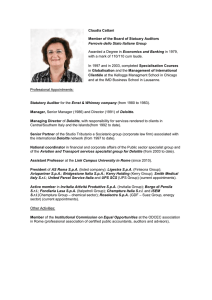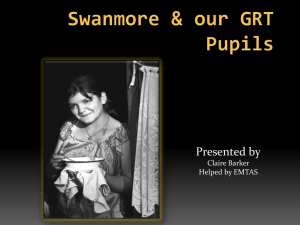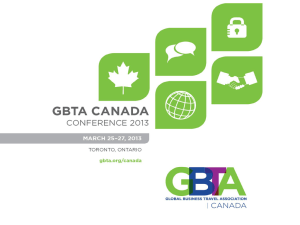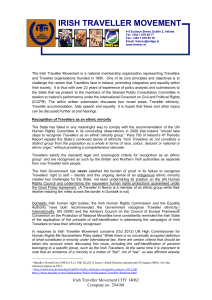Organise Business Travel Powerpoint
advertisement
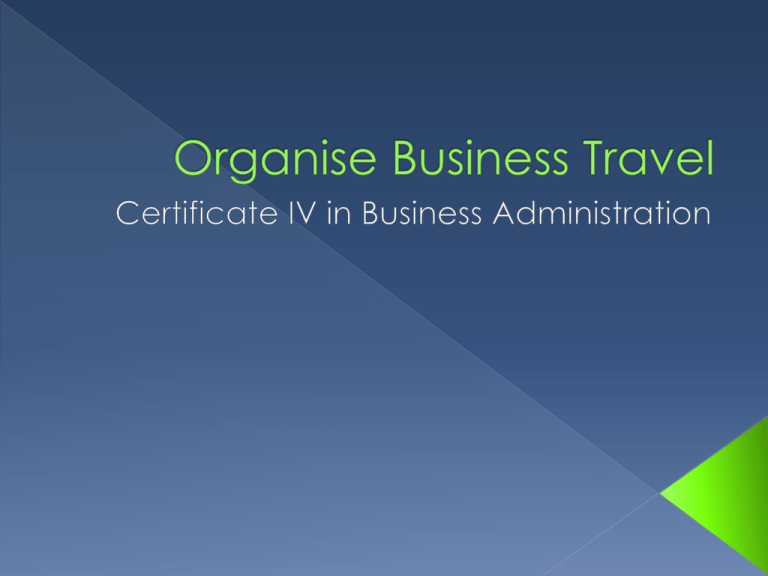
Organise business itinerary for domestic and overseas travel 2. Make travel arrangements 3. Arrange credit facilities Evidence of the following is essential: 1. › organising business-related travel for others, including scheduling and developing itineraries and travel-related documents › efficiently booking and organising travel within budgets and time constraints to meet traveller and organisation needs. 1. Portfolio submission 1.1 Practice activity 2. Evidence of arranging travel for Simwen Manager: › Completed air travel request form › Business trip folder with all the relevant documentation Globalisation › Foreign subsidiaries manufacturing products › Participation in other markets › Competition against companies located in other countries Improved Telecommunications Overseas postings Developments in international trade Staff exchange Increasing trade between Asia and Australia Discuss when staff may need to travel on behalf of the organisation. Make a list under the headings: › Intrastate travel › Interstate travel › Overseas travel Visit branch offices Buy new equipment Market products Expand export markets Attend conferences or seminars Attend trade fairs Discuss company business with interstate colleagues Speak at a conference Meet a consultant Procedure – specific method or way of doing something. Policy – plan of action adopted by company Approval process (eg names of people authorised to approve travel and expenditure - meals, taxis etc) Preferred travel agents Preferred airlines Membership details (eg frequent flyer programs) Preferred accommodation Reservation process Preferred method, class and suppliers of travel Allowable expenses Method of payment (company credit card, cash, cheque) Documentation to be completed by travellers Policies and Procedures › PF Q1, 2, 3 Air Travel Request Form › PF Q16 You have been asked to book a flight for one of the Simwen Managers from Perth to Sydney for a 10.00 am meeting next Friday, what information would you need to have access to? Travel policies and procedures Flight details (from travel agent or airline) Available accommodation (from a travel agent or your organisation, preferred list of Sydney accommodation, hotel guide) Class of accommodation & Travel Connections and transfers (details of taxi companies to take the traveller to and from the airports) Mode of transport Time differences – between Perth and Sydney Timetables Calendar (to check holidays in other States) If you understand the purpose of the trip you are planning, you will know what kind of arrangements need to be made This will make the process easier and more efficient and you will be able to make suggestions to the person you are organising travel for Documentation may have to be prepared or collated for the traveller to take on their trip Making travel arrangements is very time consuming so allow plenty of time to clarify details, make booking enquiries and confirm bookings All meetings, appointments or conference attendance should have been confirmed weeks before the departure of the traveller and details incorporated into an itinerary Traveller may have preferences. For example: › May want daily schedule structured in a certain way › Lunch breaks – opportunity to meet with a client › Time of first and last appointments Schedule needs to be structured efficiently – customers situated near each other should be seen one after another if possible Jetlag Time for travelling from the airport to the hotel, to appointments and in between appointments Proper lunch breaks are taken Limit of appointments in any one day Limit of travel in any one day Adequate rest periods and leisure time It often takes longer to achieve things in an unfamiliar environment Understand your boss’s preferences Have list of clients or people with whom to make appointments Know the amount of time to allocate to each appointment Know the time gap to allow between each one Know guidelines regarding OHS Summary of entire trip - shows daily record of travel › Accommodation, meetings, lunches, dinners, › › › › › business meetings and any special instructions Arrival/departure times Transport arrangements Times and places of appointments Names/contact numbers of people involved Documentation for appointments, eg files, company brochures, reports, tenders, contracts, or reminder notes (P/F Q 4) Record of events Traveller can easily determine their destinations and appointments Any special files or documents that should accompany them Used to identify the traveller’s whereabouts and activities by a number of interest parties Gather all details › Mode of travel › Class of travel › Transport timetables › Connections and transfers › Time differences › Budget › Accommodation (availability/class) A draft itinerary should be handed to traveller a few days prior to their departure Arrange visas Time differences Details of connections and transfers Timetables Advice about car hire and booking procedures Arrange rail or local transport passes Arrange tickets for shows Centralised booking system Access to lower fares and discounts Access to expert knowledge Reduction of errors from booking over the internet Accurate processing of complex change requests Provision of travel warnings and advice Assistance with travel insurance Assistance with processing necessary visas Follow policies and procedures › Being aware of health and safety issues › Procedure for dealing with telephone calls › How to contact clients to make appointments › How to respond to instructions/give instructions › Policies governing the use of voice/e-mail On-line Telephone Travel agent Passport Tickets Visas Travel insurance policy Travel itinerary Timetables Maps Health or medical documents Travellers cheques/expense account forms Hotel/motel confirmations Correspondence relating to trip Note relating to appointments Business cards E-ticket Paper ticket Electronic or printed airline itinerary Accommodation confirmation documents Negotiate – to arrange for or bring about by discussion with another, to talk with others in order to reach an agreement. Inserting additional appointments after itinerary prepared Cancelling pre-arranged appointments Re-scheduling existing appointments Changing travel/accommodation bookings Why might travel arrangements change? (P/F Q 13) Separate files Single file Checklist for you Checklist for traveller Company account Raising a purchase order Company credit cards/debit card Traveller pays and is reimbursed later Cash payment by the traveller with cash advance Traveller’s cheques Electronic transfer Travel request form (PF Q 16) Organise Business Travel Learning Guide Itinerary template Simwen Policies and Procedures Powerpoint presentation Practice exercise Prepare a checklist of the steps involved. Include a list documentation and materials likely to be needed Refer to airlines timetables, hotel accommodation guides Make itemized list of all expenditure incurred, provide realistic figures Provide sightseeing suggestions Prepare an itinerary outlining complete schedule and provide any additional references and documentation you think may be useful Collate the above into a travel folder
